
My Account | Online Catalogue | Contact Us
Munshi Saraswati Mandir Granthagar
(THE BHAVAN'S LIBRARY)
Category
- ONLINE QUIZ
- BOOK DISPLAYS
- May 2023: Mumbai - Story of the 7 Islands
- June 2022: Series (Multi-Volume) Publications
- December 2020: Children's Classics
- October 2020: Indian Regional Classics (Part 3)
- September 2020: Indian Regional Classics (Part 2)
- August 2020: Indian Regional Classics (Part 1)
- June 2020: Sanskrit Classics
- April 2020: World Classics
- January 2020: New Additions 2019 – English
- January 2020: New Additions 2019 – Gujarati
- January 2020: New Additions 2019 – Hin, Mar, San
- January 2020: New Additions 2019
- December 2019: Gita Jayanti
- September 2019: Teachers' Day
- August 2019: Independence Day
- October 2018: Gandhiana
- September 2018: Gujarati Popular Literature
- August 2018: Parsiana (Zoroastrian) Collection
- July 2018: Makers of Modern India
- June 2018: World Classics in English
- May 2018: Reference Works
- April 2018: Jnanpith and Sahitya Academy Winners & Publications
- March 2018: Eminent Women of India
- February 2018: Ramakrishna Movement
- January 2018: Best of Indian English Literature
- December 2017: Making of the Constitution of India
- November 2017: Chacha, Children and Priyadarshini
- October 2017: Gandhian Collection
- FEATURED BOOKS
- ઘનશ્યામ દેસાઈ (૧૯૩૪ – ૨૦૧૦) / Ghanshyam Desai (1934-2010)
- ધીરુબહેન પટેલના પુસ્તકો
- Books by Amitav Ghosh
- Books by Amartya Sen
- डान् क्विक्षोटः Don Quixote
- Children’s Classics
- Regional Classics (Part 3) - Translations
- Regional Classics (Part 2) – Translations
- Regional Classics (Part 1) – Translations
- Sanskrit Classics – Editions and Translations
- World Classics – New Editions
- The Bhagavad Gita with Eleven Commentaries
- PERSONALITIES
- DATES & EVENTS
- ARTICLES
- FESTIVALS OF INDIA
- DRAWINGS & PAINTINGS
Library Blog
Contributions like articles, book reviews, book abstracts, etc. are welcome from Library Members, Bhavan’s staff, and friends and supporters of the Library.
Featured Books: Books by Amitav Ghosh
- By Dhanashree Ghadge
Books by Amitav Ghosh - an Indian writer, best known for English Fiction and Honoured with Jnanpith Award (2018) - available with Bhavan’s Library.
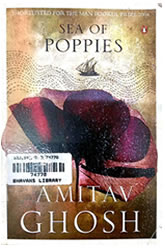
1. Ibis Trilogy 1 - Sea of Poppies
New Delhi: Penguin Books, 2008.
Ibis trilogy is a historical saga set during the outbreak of the first Opium War, fought between Great Britain and China from 1839 to 1842. The first in this trilogy was shortlisted for the Man Booker Prize.
The story is set prior to the First Opium War, on the banks of the holy river Ganges and in Calcutta. The novel interweaves the stories of a number of characters, who all, in the latter half of the novel, find themselves taking passage from Calcutta to Mauritius on a boat named the Ibis. The book traces the records of labour migration from the rural villages of Bengal to Mauritius and raises issues including zamindari system, caste hierarchy, gender discrimination, domination of patriarchy, impoverishment, destitution, exploitation of slaves, racial problem, etc.
(823(54)/GHO/74770)
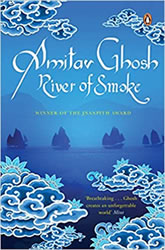
2. Ibis Trilogy 2 - River of Smoke
New Delhi: Penguin books, 2011.
Set in September 1838, book two in the trilogy, follows fortunes of people from Ibis and other ships who reach the harbours of China after facing a seastorm. The novel has characters from various cultural and geographical backgrounds whose common interest is trade with China.
(823.081(54)/GHO/74767)
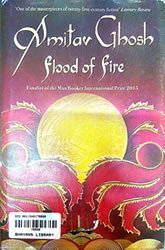
3. Ibis Trilogy 3 - Flood of Fire
India: Hamish Hamilton, 2015.
Following the storylines of the previous two parts, Sea of Poppies and River of Smoke, the story continues in 1839. The novel was shortlisted for the Hindu Literary Prize and the Crossword Book Jury Award in fiction in 2015.
(823.081/GHO/78690)
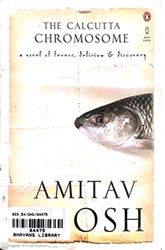
4. The Calcutta Chromosome
Haryana: Penguin Books, 2008.
The book, set in Calcutta and New York, is a medical thriller that dramatizes the adventures of people who are brought together by mysterious turn of events. The book is loosely based on the life and times of Sir Ronald Ross, the Nobel Prize–winning scientist who achieved a breakthrough in malaria research in 1898. The historical facts regarding malaria research are interconnected to create a story in three different times.
(823.54/GHO/84475)
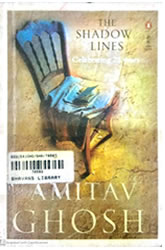
5. The Shadow Lines
India: Penguin Books, 2008.
This is a Sahitya Akademi winning novel that captures perspective of time and events, of lines that bring people together, lines that are visible or non-visible. The novel is set against the backdrop of historical events like the Swadeshi movement, Second World War, Partition of India and Communal riots of 1963-64 in Dhaka and Calcutta.
(823(54)/GHO/SHA/78593)
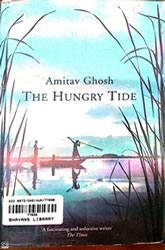
6.The Hungry Tide
New Delhi: Ravi Dayal Publisher, 2004.
The Hungry Tide is a rich, exotic saga set in Calcutta and in the vast archipelago of Sundarbans islands in the Bay of Bengal. There is a terrible, vengeful beauty here, a place teeming with crocodiles, snakes, sharks and man-eating tigers. The Hungry Tide is set in the world’s largest mangrove ecosystem - the Sundarbans, which comprises both water and earth and the intersection of landscape, water, human beings and their culture.
(823.0872/GHO/HUN/77090)
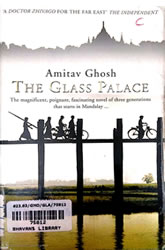
7.The Glass Palace
London: Harper Collins Publisher, 2001.
The Glass Palace is a historical set in Burma, Bengal, India, and Malaya that spans a century from the Third Anglo-Burmese War and the consequent fall of the Konbaung Dynasty in Mandalay, through the Second World War to late 20th century. This is a superb story of love and war which begins with the shattering of the kingdom of Burma, and it goes on to tell the story of people, fortune, a family and its fate.
(823.83/GHO/GLA/75812)
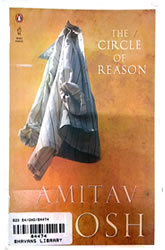
8.The Circle of Reason
Haryana: Penguin Books, 2008.
Ghosh’s debut novel (published in 1986) centers on Alu, an orphan enlisted by his foster father as a soldier in his crusade against the forces of myth and unreason. Suspected of terrorism, they are about to be arrested when a tragic accident forces Alu to flee his village. Pursued by a misguided police officer, Alu finds his way through Calcutta to Goa and to Africa. The book traces Alu’s journey across two continents.
(823.54/GHO/HUN/84474)
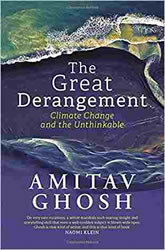
9. The Great Derangement: Climate Change and the Unthinkable
India: Allen Lane Penguin Books, 2016.
Are we deranged? The acclaimed Indian novelist Amitav Ghosh argues that future generations may well think so. In this book, Ghosh examines our inability at the level of literature, history, and politics to grasp the scale and violence of climate change.
(809/GHO/80201)